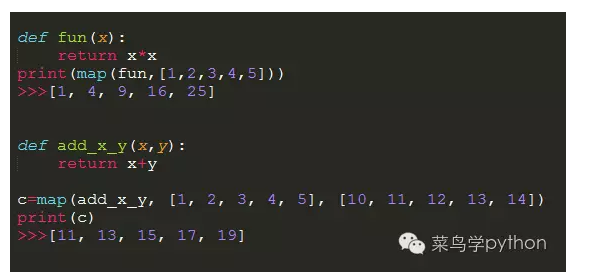1.3 python迭代工具最小计时
描述
timertool.py:
timer_compatible():根据win版、Unix版、python版本选择对应计时函数计算总时间。
mintime():计算每个迭代工具执行的最小时间。
timeiterevn.py:
timeiter_compatible():计算每个迭代工具执行的总时间、平均时间、最小时间。
示例
#timertool.py
import time,sys
reps = 1000
repslist = range(reps)
if sys.version[:3]<'3.3':
if sys.platform[:3] == 'win':
timefunc = time.clock
else:
timefunc = time.time
else:
timefunc = time.perf_counter
def trace(*args):
#print('args={}'.format(args))
pass
def timer(func,*pargs,**kargs):
begin = time.perf_counter()
for i in repslist:
ret = func(*pargs,**kargs)
usetime = time.perf_counter() - begin
return (usetime,ret)
def timer_compatible(func,*pargs,**kargs):
_reps = kargs.pop('_reps',1000)
trace(func,pargs,kargs,_reps)
repslist = range(_reps)
begin = timefunc()
for i in repslist:
ret = func(*pargs,**kargs)
usetime = timefunc() - begin
return (usetime,ret)
def mintime(func,*pargs,**kargs):
_reps = kargs.pop('_reps',50)
mintime = 2 ** 32
for i in range(_reps):
(usetime,ret) = timer_compatible(func,*pargs,_reps=1,**kargs)
if usetime < mintime:
mintime = usetime
return (mintime,ret)
# timeiterevn.py
import sys,timertool
s = '梯阅线条tyxt'*1000
def forloop():
res = []
for x in s:
res.append(ord(x)+1)
return res
def listComp():
return [ord(x) for x in s]
def mapCall():
return list(map(lambda x:ord(x)+1,s))
def genExpr():
return list(ord(x)+1 for x in s)
def genFunc():
def gen():
for x in s:
yield ord(x)+1
return list(gen())
def commstr(s):
commstr = '# '+s
print(commstr)
functp = (forloop,listComp,mapCall,genExpr,genFunc)
timetp = (timertool.timer_compatible,timertool.mintime)
commstr('-'*33)
commstr(str(sys.version))
def timeiter():
reslist=[]
for test in funcList:
usetime,result = timertool.timer(test)
reslist.append((test.__name__,usetime,result[0],result[-1],len(result)))
commstr('-'*33)
reslistsort=sorted(reslist,key = lambda x:x[1])
for L in reslistsort:
#print(commstr+'%-9s:%.5f=>[%s....%s....%s]'%(L[0],L[1],L[2],L[3],L[4]))
commstr('%-9s:%.5f=>[%s....%s....%s]'%(L[0],L[1],L[2],L[3],L[4]))
commstr('-'*33)
def timeiter_compatible():
_reps = 1000
commstr('-'*33)
for ttp in timetp:
reslist=[]
commstr('<{}>'.format(ttp.__name__))
for ftp in functp:
usetime,result = ttp(ftp,_reps=_reps)
reslist.append((ftp.__name__,usetime,result[0],result[-1],len(result)))
commstr('-'*33)
reslistsort=sorted(reslist,key = lambda x:x[1])
if ttp.__name__ == 'timer_compatible':
commstr('总时间排序')
else:
commstr('最小时间排序')
commstr('-'*33)
for L in reslistsort:
commstr('%-9s:%.5f=>[%s....%s....%s]'%(L[0],L[1],L[2],L[3],L[4]))
commstr('-'*33)
if ttp.__name__ == 'timer_compatible':
commstr('平均时间排序')
commstr('-'*33)
for L in reslistsort:
commstr('%-9s:%.5f=>[%s....%s....%s]'%(L[0],(L[1]/_reps),L[2],L[3],L[4]))
commstr('-'*33)
timeiter_compatible()
# ---------------------------------
# 3.7.8 (tags/v3.7.8:4b47a5b6ba, Jun 28 2020, 07:55:33) [MSC v.1916 32 bit (Intel)]
# ---------------------------------
# 1.4 time计时
描述
python的time模块对Windows、Unix、python版本提供不同计时方法。
| NO | 系统版本 | 对应方法 |
|---|---|---|
| 1 | Windows | time.clock() |
| 2 | Unix | time.time() |
| 3 | =python3.8 | time.perf_counter(),python3.3开始支持 |
两次调用之间的时间差用于计时。
示例
>>> import time
>>> begin = time.clock()
>>> end = time.clock()
>>> use=end - begin
>>> begin,end,use
(782.9449924, 793.3414938, 10.39650139999992)
>>> begin = time.time()
>>> end = time.time()
>>> use = end - begin
>>> begin,end,use
(1674368678.73148, 1674368685.6409733, 6.909493446350098)
>>> begin = time.perf_counter()
>>> end = time.perf_counter()
>>> use = end - begin
>>> begin,end,use
(899.3102242, 908.7626699, 9.452445699999998)
1.5 sys平台版本
描述
python通过sys模块获取平台版本信息。
| NO | 属性 | 描述 |
|---|---|---|
| 1 | sys.version | python版本 |
| 2 | sys.platform | 系统平台 |
示例
>>> import sys
>>> v=sys.version
>>> pf=sys.platform
>>> v
'3.7.8 (tags/v3.7.8:4b47a5b6ba, Jun 28 2020, 07:55:33) [MSC v.1916 32 bit (Intel)]'
>>> pf
'win32'
>>> v[:3],pf[:3]
('3.7', 'win')
1.6 sorted按键排序
用法
sorted(iterable, /, *, key=None, reverse=False)
描述
python内置函数sorted(可迭代对象,key)属于迭代工具,按指定key对可迭代对象进行排序。
key:自定义排序函数。
reverse:默认False为升序。
示例
>>> zs={'name':'张三','yuwen':90,'shuxue':100,'english':60}
>>> ls={'name':'李四','yuwen':91,'shuxue':95,'english':85}
>>> ww={'name':'王五','yuwen':80,'shuxue':99,'english':82}
>>> classOne=[zs,ls,ww]
>>> for i,stu in zip(range(1,len(classOneSort)+1),classOneSort):
zf = stu['yuwen']+stu['shuxue']+stu['english']
print("总分第{i:0>3}名:{d[name]:>4},语文={d[yuwen]:>3},数学={d[shuxue]:>3},英语={d[english]:>3},总分={zf:>3}".format(d=stu,zf=zf,i=i))
总分第001名: 李四,语文= 91,数学= 95,英语= 85,总分=271
总分第002名: 王五,语文= 80,数学= 99,英语= 82,总分=261
总分第003名: 张三,语文= 90,数学=100,英语= 60,总分=250
声明:本文内容及配图由入驻作者撰写或者入驻合作网站授权转载。文章观点仅代表作者本人,不代表电子发烧友网立场。文章及其配图仅供工程师学习之用,如有内容侵权或者其他违规问题,请联系本站处理。
举报投诉
-
生成器
+关注
关注
7文章
315浏览量
21006 -
python
+关注
关注
56文章
4795浏览量
84647 -
for循环
+关注
关注
0文章
61浏览量
2502
发布评论请先 登录
相关推荐
关于Python巧妙而强大的内置函数
python内置了一些非常巧妙而且强大的内置函数,对初学者来说,一般不怎么用到,我也是用了一段时间python之后才发现,哇还有这么好的
发表于 12-14 14:52
•539次阅读

一文详解python调用函数
函数被定义后,本身是不会自动执行的,只有在被调用后,函数才会被执行,得到相应的结果。但是在 Python 中我们要注意一个关键点,就是Python
发表于 10-01 10:45
•682次阅读
快速掌握Python的递归函数与匿名函数调用
函数是Python威廉希尔官方网站
学习中重要的一个环节,深入掌握该阶段的知识内容,对于Python威廉希尔官方网站
能力的提升非常有帮助,这里就针对递归函数与匿名函数
发表于 07-19 16:22
python提供的68个内置函数详解
内置函数就是Python给你提供的,拿来直接用的函数,比如print.,input等。 截止到python版本3.6.2 ,
进阶必备的68个Python 内置函数分析
来源: pypypypy 内置函数就是Python给你提供的,拿来直接用的函数,比如print.,input等。 截止到python版本3.
python迭代器详解
] for i in alist:... print(i)...012345 2. 是否可迭代? 对 Python 比较熟悉的朋友,肯定知道哪些数据类型是可迭代的,哪些是不可
Python支持递归函数
Python支持递归函数——即直接或间接地调用自身以进行循环的函数。递归是颇为高级的话题,并且它在Python中相对少见。然而,它是一项应该
python常用的内置函数和模块
python数字包含常用的内置函数和模块,比如pow()、abs()、floor()、int()等函数,以及math、random等模块。
python函数与函数之间的调用
函数与函数之间的调用 3.1 第一种情况 程序代码如下: def x ( f ): def y (): print ( 1 ) return y def f (): print ( 2 )x(f
python调用math函数的方法
在Python编程中,数学函数是非常重要的工具,我们可以使用它们进行各种数值计算、几何运算和统计分析等操作。Python的标准库中内置了很多数学函数
不属于python的内置函数
Python是一种高级编程语言,它提供了许多内置函数,可以帮助开发人员更轻松地处理各种任务。但是,在Python中并非所有的函数都是




 python迭代调用内置函数计时比较(下)
python迭代调用内置函数计时比较(下)










评论